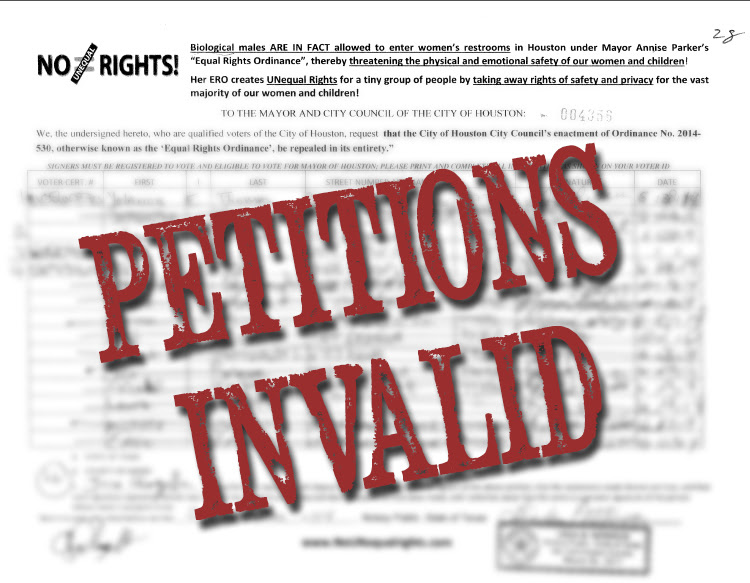I was expecting this to happen Monday, but apparently Judge Robert Schaffer handed down his ruling about which HERO repeal petition signatures were valid and should be counted on Monday.
Judge Robert Schaffer ruled on which types of signatures can be counted on the petition seeking to overturn the controversial ordinance.
According to the city charter, people gathering signatures, also called circulators, have to sign each page of collected signatures to certify that people signed in their presence. If they fail to do so, all signatures on that page are invalid.
Maybe the most significant finding by the judge is that the pages of those circulators who printed their name within an oath but did not sign underneath, are deemed valid.
Lawyers for the city argued during the trial that those should not count.
That part of the ruling is what makes Andy Taylor, lawyer for the plaintiffs, optimistic.
“It doesn’t matter if you print your name or if you sign your name, as long as it’s your authentic handwriting and you intended to validate the petition when you signed it under oath, that’s good enough,” Taylor says.
But the judge will not count signatures submitted by 12 circulators who gathered a high volume of signatures.
See here and here for the background. Before I go any farther, can someone please explain to me why KUHF appears to be the only local news outlet covering this story? As far as I can tell, the last Chronicle story was on February 13, when the jury verdict was handed down. That was a big deal as it established the facts of the case, but it is Judge Schaffer’s ruling that determines which signatures actually get counted. You’d think that might be worth a blurb or a mention on the teevee, but other than KUHF the only outlet that I can see that had a story was the Christian-oriented World Magazine:
“What it looks like is we go over the top,” plaintiffs’ lawyer Andy Taylor told me in a phone interview Monday. “I’m prayerful that we have enough.”
During a Feb. 19 hearing called by Schaffer to outline the questions he would address in his ruling, defense attorney Geoffrey Harrison pressed Schaffer to adopt the most restrictive interpretation of the Houston City Charter in order to nullify the petition. Schaffer repeatedly rebuffed Harrison and said he would be guided by the jury decision but not bound by it.
“We never had any intention of accepting the jury’s ruling as is,” Schaffer told Harrison during the hearing. “I am going to accept petitions I believe were signed and subscribed. I have said all along that I will.”
While the jury accepted the defense’s restrictive argument mandating petition circulators “sign” and “subscribe” the document’s oath, Schaffer, citing appellate court rulings as his guide, gave a much broader interpretation of that requirement. A single, legible signature—print or cursive—at the bottom of the page sufficed to complete the circulator’s oath, he ruled.
The city’s attorneys argued the jury’s finding of forgery, even if only on one page, should discredit all of a circulator’s work, which could include multiple pages. But Schaffer ruled only the names shown as forgeries—most often “family units” where one family member signed for others—should be dismissed.
Taylor admitted Schaffer’s ruling on one or two other key issues could make the plaintiffs’ victory a narrow one. With both sides recounting the petition signatures—using the jury’s and judge’s rulings as the validation criteria—the process could produce disparate numbers and require clarification from Schaffer. Taylor expects to have a final number in about two weeks.
“Given the judge’s directions provided to the lawyers, I expect the court will apply the law to the verdict and issue a final judgment confirming that the petition failed,” Parker said Monday. “The plaintiffs are expected to appeal any outcome that is not in their favor. That will be unfortunate for the city because the majority of Houston wants this divisive fight to be over so that we are able to provide equal rights protections for all of our residents.”
A copy of Judge Schaffer’s ruling is here, which I found via the HOU Equality Facebook page; they too were expecting a Monday ruling. Taylor’s optimism and the story’s angle kind of elides a big deal for the plaintiffs, namely that all petition pages gathered by the 12 circulators whose pages were found to contain forgeries and whose affidavit oaths were not found to be “true and correct” will be tossed. I wish I had some idea what proportion of the signature pages were the responsibility of these 12, but I don’t. I suspect this will take a big chunk of otherwise verifiable signatures out of play, but who knows? Maybe these pages contained the bulk of the signatures that had been disqualified the first time anyway. We won’t know till everyone shows their hand in two weeks or so. Whatever numbers everyone comes up with, an appeal will follow. Texas Leftist, from whom I got the KUHF link, has more.

